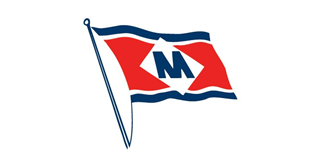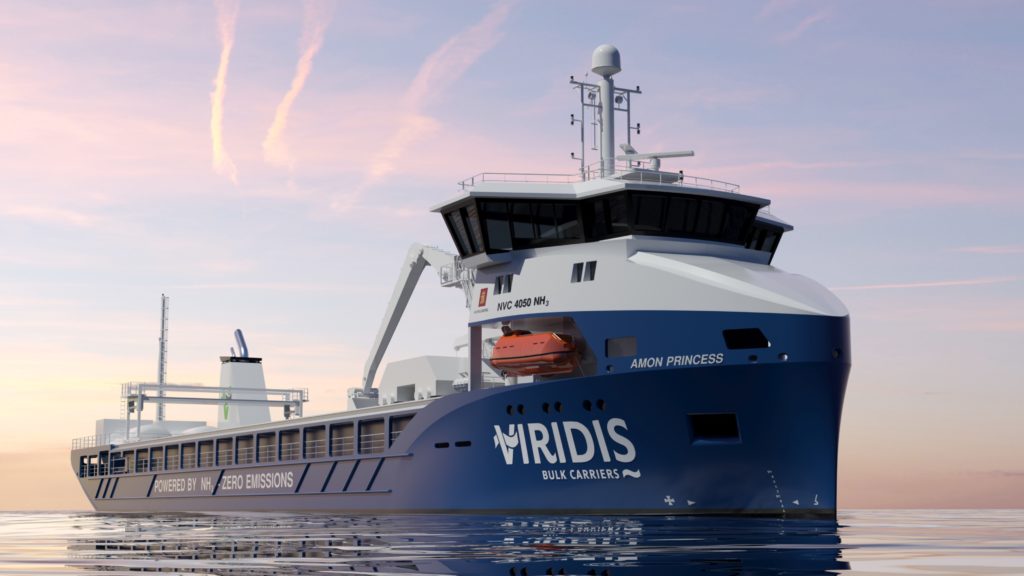Ammonia-powered shipping company Viridis Bulk Carriers and consortium partners are awarded NOK 13.75 million in development funding from the Norwegian Pilot-E program to realize a carbon free short sea bulk transportation service comprising cargo, ships- and fuel logistics in the project “FlexBulk – NH3 Power”.

Grant support from Norwegian Government to drive decarbonisation of shipping
The Pilot-E program is a collaboration between the Norwegian Research Council, Innovation Norway and ENOVA, designed to support innovative maritime projects from idea stage to full scale realization. The grant includes support from each of the institutions. The value granted to Viridis Bulk Carriers does not yet include investment grant from ENOVA.
Viridis Bulk Carriers is a new joint venture solely focused on building and operating ammonia-powered short sea bulk vessels, optimally structured with a unique combination of expertise and resources technically, operationally and financially. The Viridis vessel platform is directly applicable for 3 000+ ships in Europe and indirectly applicable for most others shipping segments.

- This award is a recognition of our vision and marks a milestone in our commitment to an environmentally friendly fleet renewal. Through our FlexBulk project, we will build the world’s first short-sea fleet based on ammonia as fuel, and we are pleased that the Norwegian authorities are helping to promote innovative initiatives towards the green shift, says Espen Nordstrøm at Viridis Bulk Carriers / Navigare Logistics.
Close collaboration with Client Partners
Together with Client Partners Elkem, Yara, Franzefoss Minerals, Vestkorn, Saltimport, Viken AT Market and Biomar all cargo flows will be evaluated to find the best synergies to optimize the trading of the vessels. These seven charterers alone have an underlying short sea bulk cargo volume of 20 million tons across 5 000 + shipments per annum, equal to 100 ships in operation.
The project will realize commercial viability of zero emission solutions through business model innovation and increased ship utilization – based on a significant optimization effort.
 Elkem earlier this year announced a new climate roadmap detailing how the company plans to develop its business in line with the aim of the Paris agreement, reducing emissions towards net zero while growing supplies to the green transition. The FlexBulk project with Viridis Bulk Carriers, fits with our strategy to start reducing emissions from ocean transportation as soon as possible, says Ellen Groeneveld, Managing Director at Elkem Maritime Center.
Elkem earlier this year announced a new climate roadmap detailing how the company plans to develop its business in line with the aim of the Paris agreement, reducing emissions towards net zero while growing supplies to the green transition. The FlexBulk project with Viridis Bulk Carriers, fits with our strategy to start reducing emissions from ocean transportation as soon as possible, says Ellen Groeneveld, Managing Director at Elkem Maritime Center.
-
 Franzefoss Minerals are moving large cargo volumes at sea and we need to reduce the carbon foot print in our logistical chain. Being part of the Flexbulk project is important for Franzefoss and we look forward to Viridis Bulk Carriers bringing green vessels to the market, says Nils-Petter Eriksen, Chief Sales Officer at Franzefoss Minerals AS.
Franzefoss Minerals are moving large cargo volumes at sea and we need to reduce the carbon foot print in our logistical chain. Being part of the Flexbulk project is important for Franzefoss and we look forward to Viridis Bulk Carriers bringing green vessels to the market, says Nils-Petter Eriksen, Chief Sales Officer at Franzefoss Minerals AS.
-
 Sustainability is at the core of our business model in Vestkorn. The company is founded on sustainable food production, and we work every day to get people to eat more plant based. 80% of the remaining CO2 emissions in our value chain, which we can influence ourselves, come from transport. Viridis’ FlexBulk project uses the right approach, and we look forward to using these ships to transport our goods in the future, says Aslak Lie, CEO at Vestkorn.
Sustainability is at the core of our business model in Vestkorn. The company is founded on sustainable food production, and we work every day to get people to eat more plant based. 80% of the remaining CO2 emissions in our value chain, which we can influence ourselves, come from transport. Viridis’ FlexBulk project uses the right approach, and we look forward to using these ships to transport our goods in the future, says Aslak Lie, CEO at Vestkorn.
-
 This grant is very important to the Viridis project and an important step to start the decarbonization of shipping, Yara Clean Ammonia is a global producer of Ammonia as a shipping fuel, and also involved in developing bunker solutions. This is a ground-breaking collaborative project where the visionary companies are taking the first big step to make ammonia as zero-emission fuel a realistic option for the future, says Murali Srinivasan, Senior Vice President, Yara Clean Ammonia.
This grant is very important to the Viridis project and an important step to start the decarbonization of shipping, Yara Clean Ammonia is a global producer of Ammonia as a shipping fuel, and also involved in developing bunker solutions. This is a ground-breaking collaborative project where the visionary companies are taking the first big step to make ammonia as zero-emission fuel a realistic option for the future, says Murali Srinivasan, Senior Vice President, Yara Clean Ammonia.
- Yara is committed to contribute on the decarbonization of the food value chain and is successfully working on reducing its carbon footprint. Ammonia fueled vessels are also expected to reduce Yara’s own GHG emissions on shipping and transport, says Angelo Biancardi, Vice President of Yara Maritime Logistics.
-
 Viken AT Market manages an important sustainable resource for the green shift. This resource is important both for our generation and not least future generations. We have a focus on the entire value chain and more sustainable logistics solutions are an important part of this. The Flexbulk project helps us on our way to our goals towards contributing to a green shift also in shipping, says Kjersti Denver, Supply Chain Manager at Viken AT Market.
Viken AT Market manages an important sustainable resource for the green shift. This resource is important both for our generation and not least future generations. We have a focus on the entire value chain and more sustainable logistics solutions are an important part of this. The Flexbulk project helps us on our way to our goals towards contributing to a green shift also in shipping, says Kjersti Denver, Supply Chain Manager at Viken AT Market.
 The UN has declared the decade we have now entered, the decade of the Sea. The ocean is crucial for all life, and BioMar will lead in ocean-based climate measures in our industry. Therefore, the development of new carbon-free solutions in shipping is important, and Flexbulk is a significant step in getting the decarbonization within the maritime industry started, says Tore Gunnar Wikdal, Director Distribution and Inbound Logistics at BioMar.
The UN has declared the decade we have now entered, the decade of the Sea. The ocean is crucial for all life, and BioMar will lead in ocean-based climate measures in our industry. Therefore, the development of new carbon-free solutions in shipping is important, and Flexbulk is a significant step in getting the decarbonization within the maritime industry started, says Tore Gunnar Wikdal, Director Distribution and Inbound Logistics at BioMar.
 As a total supplier of salt products which is a sustainable raw material with great national significance for both road, industry and fisheries, Saltimport has a strong focus on sustainable solutions. Saltimport has a clear goal of reducing the carbon footprint and offering the most environmentally friendly freight options for our customers and partners, and an award from Pilot-E makes the project a step closer to realization. For Saltimport, which focuses on innovation and sustainable solutions, the project is very important in helping to reduce emissions in the value chain. We look forward to further cooperation and help to find a carbon-free solution for sea transport, says Lisbeth Nordal, Dry Cargo Broker at Saltimport.
As a total supplier of salt products which is a sustainable raw material with great national significance for both road, industry and fisheries, Saltimport has a strong focus on sustainable solutions. Saltimport has a clear goal of reducing the carbon footprint and offering the most environmentally friendly freight options for our customers and partners, and an award from Pilot-E makes the project a step closer to realization. For Saltimport, which focuses on innovation and sustainable solutions, the project is very important in helping to reduce emissions in the value chain. We look forward to further cooperation and help to find a carbon-free solution for sea transport, says Lisbeth Nordal, Dry Cargo Broker at Saltimport.
-
 The shift to a more sustainable future requires collaboration. Flexbulk is a unique example with broad commitment from 7 client partners who will achieve significant synergies between them. Combined with Viridis Bulk Carries, an innovative shipping company, they are positioned to lead the green shift in short sea shipping. Ocean Hyway Cluster is proud to be part of this project, fulfilling our mission to develop carbon-free hydrogen-based fuels for shipping, says Kristin Svardal, Innovation Manager at Ocean Hyway Cluster.
The shift to a more sustainable future requires collaboration. Flexbulk is a unique example with broad commitment from 7 client partners who will achieve significant synergies between them. Combined with Viridis Bulk Carries, an innovative shipping company, they are positioned to lead the green shift in short sea shipping. Ocean Hyway Cluster is proud to be part of this project, fulfilling our mission to develop carbon-free hydrogen-based fuels for shipping, says Kristin Svardal, Innovation Manager at Ocean Hyway Cluster.
-
 SINTEF Ocean is looking forward to finding new solutions for coastal bulk transport in the FlexBulk project. The combined know-how and expertise in the consortium provides an excellent platform for developing robust solutions for the market, says Anders Valland, Research Manager at SINTEF Ocean.
SINTEF Ocean is looking forward to finding new solutions for coastal bulk transport in the FlexBulk project. The combined know-how and expertise in the consortium provides an excellent platform for developing robust solutions for the market, says Anders Valland, Research Manager at SINTEF Ocean.
Ammonia-powered ships with excellent capabilities and range
The ships will be sufficiently flexible to handle varying types and volumes of cargo, in terms of both operational range and functional capabilities, while maintaining crew and societal safety at the level of conventional ships. Viridis Bulk Carriers expect to place the first shipbuilding orders within the end of 2022, with deliveries starting in 2024/25.
 The application phase for the grants has been a close cooperation between Kongsberg Maritime’s Ship design and Energy departments and Viridis Bulk Carriers, where KONGSBERG has the capability to provide the technology and integrated solutions required for such project. Viridis Bulk Carriers willingness to promote environmentally friendly, human, safe and efficient operation is entirely in line with KONGSBERG‘s goals and are incorporating sustainability into everything we do, says Egil Haugsdal, President at Kongsberg Maritime.
The application phase for the grants has been a close cooperation between Kongsberg Maritime’s Ship design and Energy departments and Viridis Bulk Carriers, where KONGSBERG has the capability to provide the technology and integrated solutions required for such project. Viridis Bulk Carriers willingness to promote environmentally friendly, human, safe and efficient operation is entirely in line with KONGSBERG‘s goals and are incorporating sustainability into everything we do, says Egil Haugsdal, President at Kongsberg Maritime.
Ammonia-powered ships and fuel infrastructure being developed in parallel
The project “Flexbulk – NH3 Power” is closely related to the sister-project “Ammonia fuel bunkering network” project which received NOK 89 million from the Norwegian Green Platform program earlier this year. Together, the two projects remove the chicken-and-the egg dilemma for introducing new fuels.
The granted support will expedite technical and commercial development and be an enabler, catalyst and accelerator for introducing ammonia fuel in shipping. Global adoption of ammonia as marine fuel has a massive potential to reduce carbon emissions, since it is scalable to serve the entire deepsea shipping fleet.
-
 Our strategy is to lead the green shift in shipping through commercial and technical innovation. We are certain that the Pilot-E grant from the Norwegian government will prove to be an important success factor for placing the first ammonia-powered cargo ships on the water, says André Risholm at Viridis Bulk Carriers / Amon Maritime.
Our strategy is to lead the green shift in shipping through commercial and technical innovation. We are certain that the Pilot-E grant from the Norwegian government will prove to be an important success factor for placing the first ammonia-powered cargo ships on the water, says André Risholm at Viridis Bulk Carriers / Amon Maritime.

Viridis Bulk Carriers AS | Barbros gate 14, 4550 Farsund, Norway
Viridis Bulk Carriers is a joint venture between Navigare Logistics, Amon Maritime and Mosvolds Rederi. The joint venture will develop, build and operate ammonia-powered bulk carriers, drawing on the expertise, networks and capabilities of each of the partners.
Please contact:
Commercial inquiries - Technology manufacturers
- Steinar Kostøl
- Tel: +47 9700 5327
- Email: sk@amonmaritime.com

Navigare Logistics is part of the Navigare group, founded in 1966. The company owns, operates and manages 14 short-sea bulk carriers, and are providers of complete logistical solutions for the maritime industry.
Amon Maritime are zero emission ship project specialists, focused on ammonia fuel. Established in 2019 by founders with strong backgrounds from complex ship newbuilding projects from idea to operations, expert knowledge of gas engines, fuel supply, zero emission solutions and innovative ship designs.
Mosvolds Rederi has a proud maritime history, established in 1910. Today, the company holds direct ownership in 17 deepsea ships and are co-owners of Njord Shipping and Amon Maritime. The company is part of Glastad Holding, a large, family-owned investment company.



